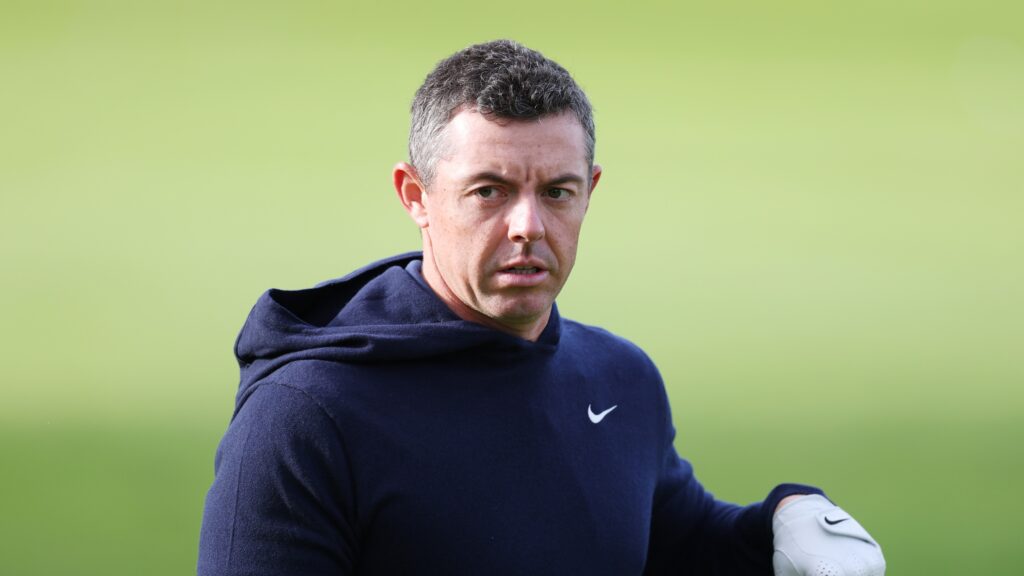Rory McIlroy’s Frustrations at the Amgen Irish Open: A Call for Common Sense in Golf’s Slow Play Rules
Rory McIlroy, a prominent figure in the golf world and the current Masters champion, recently expressed his frustrations regarding the slow play warnings he faced during the Amgen Irish Open at the K Club. This incident has sparked discussions about the application of common sense in the enforcement of timekeeping measures in professional golf. McIlroy’s feelings of agitation were palpable as he navigated a challenging round while being closely followed by a significant crowd.
The slow play situation unfolded early in McIlroy’s round, raising questions about the existing rules surrounding pace of play. Alongside his playing partners, Thriston Lawrence and Kristoffer Reitan, McIlroy found himself under scrutiny for slow play, despite the extraordinary circumstances that come with being one of the sport’s biggest stars. He reported feeling rushed, particularly in the latter portion of his round, which contributed to a less-than-ideal performance.
It’s essential to understand that professional golf attracts immense attention, especially when stars like McIlroy are in the spotlight. The large crowds, camera crews, and media presence undoubtedly add layers of complexity to the experience. McIlroy ended his first round at the Irish Open with a score of 71, reflecting on how the pressure impacted his game. After bogeying two of his final three holes, he remarked, "In all honesty, I felt a little rushed out there for the last 12 holes."
Both Lawrence and Reitan struggled in their rounds with scores of 81 and 77, respectively, but the focus remained predominantly on McIlroy due to his stature in the game. The trio was placed on the clock by tournament officials, a decision that McIlroy felt could have been handled differently. His appeal for common sense in rulings suggests that tournament organizers need to recognize the unique challenges faced by high-profile groups.
As McIlroy explained to reporters, their group was put under time pressure twice during the round, including the final three holes. This led to a tense atmosphere, compounded by the anticipation and excitement of the spectators that followed McIlroy. While maintaining his composure, McIlroy advocated for leniency from officials, emphasizing the additional pressures that elite players face during high-stakes events.
McIlroy’s frustrations also highlight a broader issue in professional golf — the need for flexibility and understanding in the application of rules. When elite players are engaged in a high-visibility event, it should be expected that they will experience delays caused by audience interaction and broadcasting requirements. The additional time taken for McIlroy’s group to complete their round is a necessary consequence of featuring one of golf’s top players.
His call for common sense emphasizes a critical aspect of any sport: the balance between enforcing rules and accommodating the unique circumstances that can arise. While pace of play is undoubtedly important for the overall flow of the tournament, officials need to recognize the dynamics at play—literally and figuratively—when handling elite competitors. McIlroy expressed this sentiment candidly, stating, "Sometimes I feel like they have to give us a little bit of leeway."
The debate surrounding slow play in golf has been persistent, prompting discussions on how best to create a more enjoyable experience for both players and fans. As tournament organizers seek to enhance the overall atmosphere of golf events, they must consider the implications of strict enforcement without context. The demands on high-profile players, especially in a European setting, should be acknowledged and handled with care.
Players like McIlroy serve not only as athletes but as ambassadors for the sport, drawing new fans while fostering existing interest. Recognizing their unique challenges not only helps them to perform at their best but enriches the viewer experience. When McIlroy urges for adjustments in handling slow-play regulations, it’s a reminder to golf governing bodies that flexibility can lead to more engaging and competitive tournaments.
In conclusion, Rory McIlroy’s experience at the Amgen Irish Open shines a light on the importance of applying common sense in golf’s regulatory practices. As the sport continues to evolve, a greater emphasis on understanding the unique pressures faced by top players can lead to improved experiences for all involved. The dialogue surrounding slow play and its enforcement is ongoing, suggesting that changes may be necessary to enhance both player performance and fan enjoyment in the world of professional golf.


